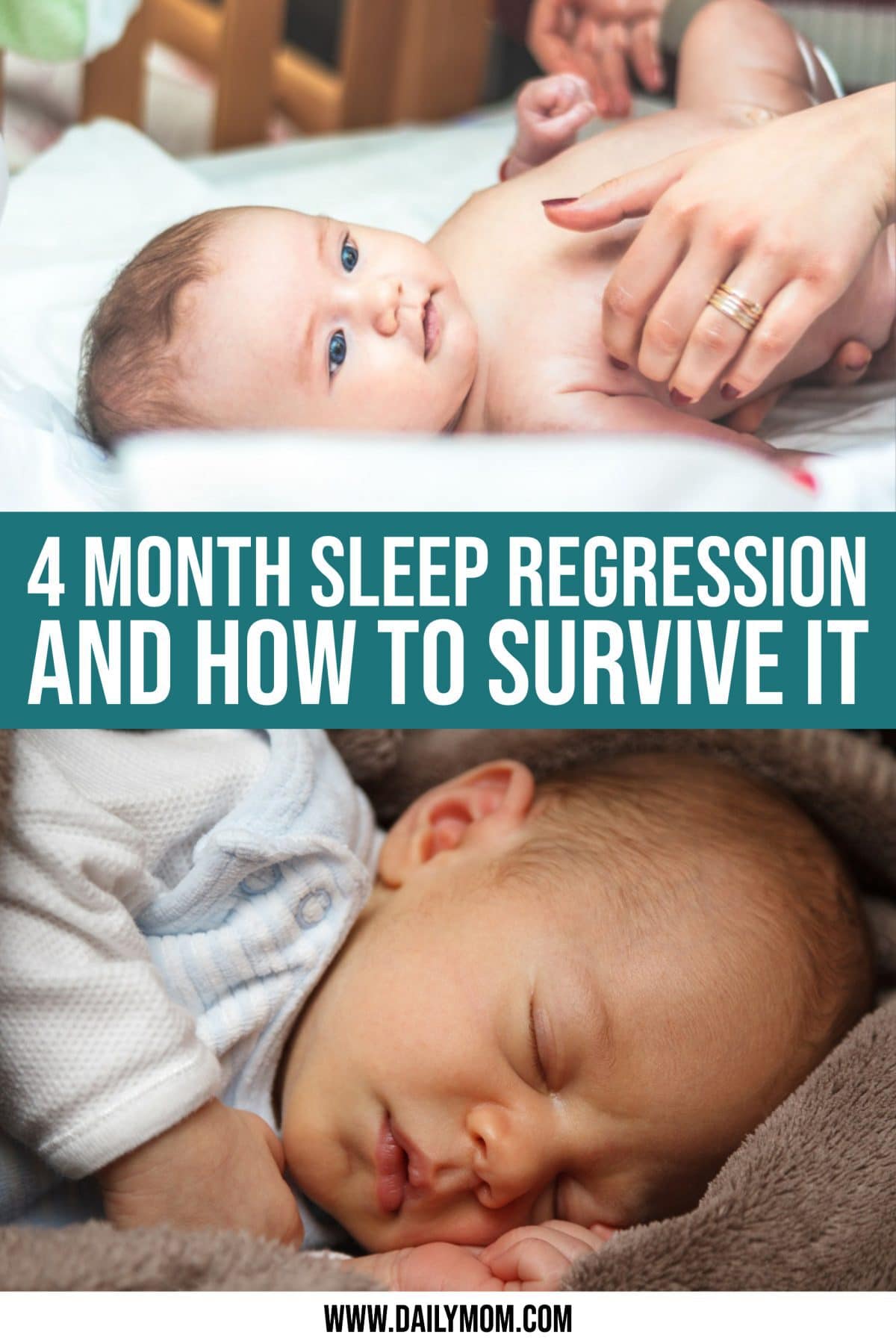The first time your baby sleeps through the night, you may wake in a sheer panic thinking something is wrong because the silence is deafening. You check the monitor, bassinet next to your bed or even feel your baby to quickly discover your baby is just peacefully sleeping. That peaceful sleeper might surprise you and sleep through the night a few nights in a row.
A few nights in a row soon turn into a couple of weeks. The next thing you know, you are silently doing a little jig in celebration of no longer being a walking, sleepless zombie! Is this too good to be true at only 2-3 months of age? Well, it might be. If you haven’t heard of the 4-month sleep regression, it is a real thing but something you can mentally prepare for.

What is the 4 month sleep regression?
Sleep regression is a period of time where your baby experiences poor sleep after a history of sleeping well. Sleep regression also seems to come out of nowhere and can you throw you off if you’re not prepared. Around 3-5 months of age, our babies sleep patterns begin to change. Babies are no longer sleeping as newborns but maturing in their sleep patterns. Babies begin to spend more time in lighter sleep (non-REM sleep) which causes them to wake more frequently. This is huge for them and even though it might be a tough couple of weeks on parents, it is a developmental milestone for your little one!
How to identify sleep regression
- Frequent waking/stirring at night
- Fights falling back to sleep
- Increased crying/fussiness
- Naps become shorter
- Potential changes in appetite
Tips for surviving 4 month sleep regression
Read More: Everything You Need to Know About Baby’s Growth Spurts
It might be nice to think your baby may not go through this phase, however, this is part of your baby’s growth and development. Here are 5 tips for trying to survive your upcoming sleepless nights:
- Maintain your daily schedule. Keeping your daily routine with your baby (naps, eating times, playtime, etc.) will help your little one stay on track. If their daytime stays consistent, chances are this will help their nighttime sleep stay consistent as well.
- Put them down drowsy. Let your little one start practicing on their own. You are probably familiar with this sleeping rule of thumb. It is best to put babies down when they are not fully asleep but drowsy and comfortable to help them learn to fall asleep on their own.
- Wait it out. The immediate mama bear reaction is to soothe your crying baby. If you hear baby wake, give them a few minutes before responding. You may be surprised that they fall back to sleep on their own within a short period of time. If they do not and continue to cry, respond and comfort them as needed.
- Sleep environments are critical. Make sure the room is dark and at a comfortable temperature for your little one. If you have not already done so, it might be helpful to add a sound machine with white noise. With your baby sleeping lighter, the white noise will help drown out the neighbors barking dog, your doorbell ringing with a delivery or accidentally slamming a kitchen cabinet.
- Let others help. Don’t try to be a rockstar on your own. Take shifts with your partner and if you have family, friends or anyone willing to help…let them! Your baby needs sleep and so do you. Take time out for a nap or 30 minutes of “me” time.
Read More: How White Noise Can Help You and Your Baby Sleep Better
How long will this last?
The 4 month sleep regression does not look the same for every baby and typically lasts between 2-6 weeks. Some babies may cycle through this stage in a couple of days, others may take weeks. The good news is that your baby is growing and learning new things. The 4 month sleep regression is one of many developmental phases and will be over before you know it!
Read More: 6 Ways To Get Better Sleep

Will there be more sleep regression phases?
Unfortunately, yes. The sleep regression phases are tied to developmental milestones for your little one. Though they wreak havoc on your baby’s sleep and your sanity, these phases are tied to their maturing sleep patterns. The phases for sleep regression are typically at 4 months, 8 months and 18 months. The 8 month sleep regression is sometimes referred to as the 9 month sleep regression because it can appear between 8 and 10 months of age.
The 4 month sleep regression will not last forever, we promise there is an end in sight. Provide your baby with a consistent schedule and the environment needed to get through this phase. Put your coffee pot on repeat and start sipping away. You’ve got this mama!
WANT TO READ MORE?
Check out this article on The Signs Of Sleep Deprivation And Ways To Prevent It.










































